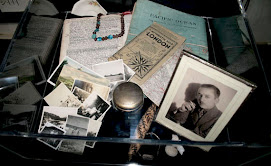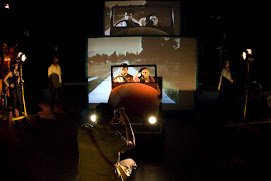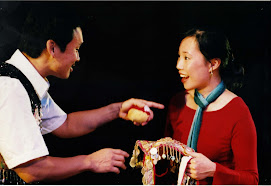Got back from England a week ago. My body clock has finally caught up with me on this side of the planet, and I find myself overcome with the urge to clear out—clean out over-stuffed filing drawers, old clothes, herbs and spices past their use-by-dates. I’d like to think this cleaning frenzy is simply a time of year thing—it is spring, after all, but I suspect I’m avoiding a radio script that I should be working on. It’s at that stage where I’ve done a lot of reading and research and made a lot of notes, but still, frustratingly, have no solid narrative or clear story world. Even the characters are fuzzy. Let’s hope inspiration comes to me as I fill garbage bags with papers and faded T-shirts …
Today I extended the cleaning jag to my computer and started deleting old emails. That’s when I came across a link to a 2007 article from The Guardian by Anthony Neilson. He’s basically telling playwrights not to be boring. No argument there. But this paragraph towards the end of the article caught my attention:
‘ … there’s a lot of poetic dialogue around. Sometimes a play is narratively accessible but the dialogue is mannered to the point of incomprehensibility. Some people like it, but I’m suspicious. Poetic dialogue, done badly, leaves no room for subtext. A lack of subtext is fundamentally undramatic. And boring.’
As a writer whose performance work is often described as ‘poetic’, my initial reaction to this statement was to disagree. I find naturalistic dialogue, when done badly, thin and pedestrian. It reduces theatre to work-a-day TV without the locations. Poetic dialogue can be subtle and work by suggestion and association; it can use metaphors to convey internal emotional states; it can sculpt language like designers use space or lighting designers compose with light; it can draw on and make manifest the inherent musicality of theatre.
Many years ago when workshopping Historia at an ANPC Conference, a dramaturg told me that actors find it hard to be emotional in non-naturalistic or poetic text. When he said that, I wanted to ask him: where does that leave Shakespeare? Not to mention those Jacobean dramatists I love like Webster, Middleton, Tourneur and Ford. Think of the candlelit and treacherous universe in which they moved, of sin unpunished, of innocence destroyed. Even the titles of their plays are strangely seductive, trapdoors to something beautiful and wicked that trickles beneath the surface of mortality: The Malcontents, The White Devil, The Broken Heart.
Since then, I’ve thought a lot about poetic dialogue, and I think Neilson’s got a point. Kind of. So here’s my riff on the pitfalls of the poetic in performance:
When a script gets labelled ‘poetic’ chances are its poetry and poetics won’t receive any further comment or critical input. This is unfortunate.
Poetry is a distilled, economical form of writing that can be many things—active, introspective, muscular, analytical, moving, funny, whimsical or robust. It can be direct and it can be plain in its syntax and metre. It can also be elusive. It requires discipline on the part of the playwright. It is not an excuse for a mud of adjectives, overblown description or a lack of dramatic action.
Whether I’m working on my own script or someone else’s, these are some of the questions I ask about the play’s poetics: Is the poetic lexicon sufficiently distinctive and varied? Or is it limited and predictable? Can it cut to the quick when it needs to, or does it circle aimlessly? Does it drift, or is it sharply focused? Does it invite the spectator into its world?
There’s more to say on the subject, of course, but I really should get back to that radio script. And to ‘keep myself on task’ here’s a favourite quote from Robert Wilson:
‘My ideal theatre would be a cross between the radio play and the silent movie. The problem with most theatre buildings for me is that they form a tight frame, the picture frame of the proscenium stage, which constricts and limits the fantasy. But when I listen to a radio play, I can look out the window and look at an airplane or a couple of lovers or the birds.’
Subscribe to:
Post Comments (Atom)
+Photo+Leah+McGirr+3.jpg)




4 comments:
Was it Cocteau who said "poetry in the theatre ought to be like rigging on a ship - visible from a distance"?
I think the theatre is inherently poetic. As soon as an actor walks onto the stage, you have a metaphor. The poetics of the theatre begin there, as Shakespeare understood very well. And Ibsen. And Mamet and Pinter and Churchill and Kane. Poetry isn't something tacked on afterwards, it's in the muscle of the text. But I do think it's different from poetry per se, which is, for all that it's a cousin, in that both are embodied language, quite a different skill.
And yes, quite, a lot of flowery language isn't "poetry", on the page or in the mouth of an actor.
Hi Alison,
Love that Cocteau quote.
Theatre can be poetic in many ways, not all of them involving language or spoken text. What I’m particularly interested in at the moment is poetically inclined or inspired dialogue (or monologue or spoken narrative text) in theatre; its limitations as well as its various capacities and pleasures.
Agree that poetry written for the page is quite a different beast from poetic dialogue, but I think there is an area where poetry and performance overlap or knock into each other, and I’m really interested in that area. Which is more than 'performance poetry' or the kind of work favoured by slams.
Still working this one out, so thoughts and ideas all welcome,
Noëlle
I know people who say that kane's 4:48 Pyschosis isn't a play but a poem. It certainly brings brings poetry and theatrical writing into the same room, but I still think it's a theatre text rather than a poem. I guess there's lots of room for disagreement - well, poetry sparks more disagreement than practically anything I know! But to be honest I can't imagine a successful theatre text without a poetic dimension in the language - in the end for me it's a question of degree. One of poetry's virtues is its capacity to exploit the ambiguities and allusive qualities of language, as well as its sheerly sensuous beauty, and that can work wonderfully in the theatre. But it's difficult to do.
(Fwiw, I think "performance poetry" for the most part doesn't exhibit much understanding of poetry or performance...)
PS There's a wonderful page at the Buffalo Electronic Poetry Centre which has links to MP3s of sound poetry, where poetry qua poetry and performance intersect in all sorts of interesting ways - they've got recordings of Kurt Schwitters, Guilliame Appollinaire, Vladimir Mayakovsky, Jospeh Beuys, William Burroughs and lots of others... http://epc.buffalo.edu/sound/soundpoetry.html
Post a Comment